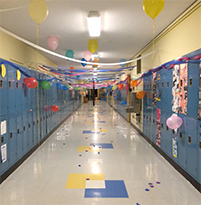Saint Agnes School strives to follow the Academic Benchmarks set by the Archdiocese of Boston (RCAB) across all aspects of the curriculum:
- The theory and practice of the Church’s social teachings are embedded into the curriculum.
- Scripture and Catholic intellectual tradition are used in all subjects to help students think critically and ethically about the world around them.
- The moral and spiritual life of the school, through its culture, climate, and curriculum, is designed to help students identify, define, and live in accordance with core principles of Catholic social teachings and habits of mind that aid in the development of strong moral character.
4. Classroom instruction is designed to help all students’ strengthen and grow their multiple cognitive intelligences, meeting the needs and capabilities of all students and their individualized learning needs.
5. Classroom instruction is designed to engage and motivate all students through the implementation of rigorous, standards-based instructional objectives, activities, and assessments aligned to best practices in cognitive learning science.
6. Classroom instruction is designed to intentionally address Catholic habits of mind and the affective dimensions of learning, which include emotional, social, moral, spiritual, and motivational development.
7. Curricula prepare students with the knowledge, understanding and collaborative skills to become creative, reflective, literate, critical, and moral evaluators, problem solvers, and decision makers.
8. Curricula prepare students to think and to learn within and across all academic disciplines to better uncover God’s revelation.
9. Curricula prepare students to become socially responsible global citizens by providing access to learning experiences within and across core subject areas (English language arts, mathematics, religion, social studies, science) that address questions of how to live morally in our current society.
10. Classrooms provide students the chance to use the engineering design/problem solving process (i.e., ask, imagine, plan, create, and improve) to develop meaningful solutions to challenges in our classroom, school, and community through the lens of the Catholic worldview.
11. Classrooms provide students the chance to become expert and responsible users of technology, able to create, publish, and critique digital media and respectfully communicate in ways that reflect their understanding of content, Catholic culture, and technology skills.
12. Classrooms provide students the chance to express Catholic culture and faith through the arts: dance, media arts, music, theatre and visual arts.



